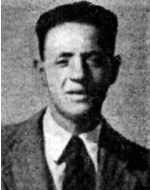Minkowski, Mordechai
Son of sculptor and Avraham-Yehuda, was born in 1919 in Radom, Poland. He studied in a “cheder” and in a Polish primary school, and later studied carpentry and worked in this profession. When he was 16, he joined the He – Chaluts movement and spent four years in training at the Borochov kibbutz near Warsaw. At the age of 20 he was drafted into the Polish army and served in a heavy artillery unit. He bravely defended his Jewish honor not only against anti-Semitic Poles, but also against the Jews of Buzy with them. Once, at a military parade, when a Jewish soldier heard a mockery of the Jewish religion before the gentiles, he jumped off the line and slapped his face. The Polish officer understood him and, despite the gravity of the offense, dismissed him with a symbolic punishment. While serving in the army, World War II broke out. When the German occupation authorities issued an order to stand up for Jews who had once been soldiers, Mottel escaped to Lwow in the Russian-occupied zone and from there encountered many difficulties for Russia, hiding for practical reasons his Zionism and pioneerism. He was noted as a good and diligent laborer in a factory in Dnipropetrovsk, in the coal mines in Donbass and later in Ashkar-Ola. When the Polish army was established in Russia, under the command of General Anders, he volunteered and came with him to Israel through Iran. He continued to fight the Polish army in the Libyan desert and their artillery in Tobruk. After the enemies were expelled from the land of Tripolitania and no longer endangered the Land of Israel, Motel came here on leave as a soldier and changed his uniform in a pioneer’s uniform. He spent a year in Kibbutz Merhavia and liked his friends and then moved to Magdiel, where his friends and friends sat and worked in orchards, picking and packing. Many benefited from his honesty, his good temperament and his generosity to the aid of others, but he himself delayed these virtues from progress on the road to economic advancement. When Magdiel was on the front line during the War of Independence, he went to the posts with joy, saying: “I fought for Tobruk for English and Poles, and here I am fortunate to have fought for my people.” With dedication he continued to serve in the defense of the colony, and often stood for 14 consecutive hours with his weapon and his eyes searching the area in front of him – until he hit an enemy bullet in the head on the 24th of Adar 5708 (March 5, 1948). Was put to rest at the cemetery in Magdiel.
